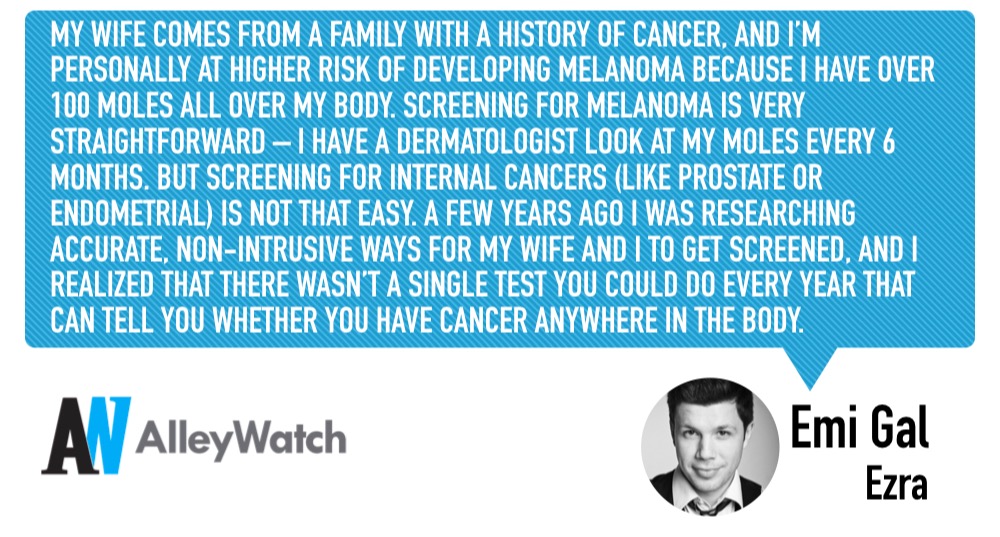Prostate cancer is the most common form of cancer in men and the current standard of testing, PSA blood tests are not optimal as PSA often fluctuate and do not provide an accurate gauge, which ultimately leads to unnecessary and avoidable biopsies. Launching today is Ezra, a startup that is simplifying cancer detection starting with prostate cancer. Ezra has introduced, the first of its kind, a direct-to-consumer annual health membership costing $999 that gives members access to yearly prostate cancer screenings at one of Ezra’s partner imaging facilities. Screenings are conducted using MRI coupled with Ezra’s proprietary AI technology to review the results quickly and accurately.
AlleyWatch sat down with founder Emi Gal to learn more about Ezra and about the companies ultimate vision to create a highly accurate, whole-body MRI scan that can detect any internal abnormalities in just one session.
Who were your investors and how much did you raise?
We recently raised a $4M Seed round led by Accomplice. Additional strategic investors include Founders Future, Credo Ventures, Seedcamp, Esther Dyson and a number of startup founders and angel investors.
Tell us about the product or service that Ezra offers.
We provide a direct-to-consumer health membership that gives our members access to prostate cancer screening using MRI and AI. Our members sign up for an Ezra membership, schedule an appointment at one of our partner imaging facilities to get their prostate MRI scan, and receive a cancer screening report within 48 hours.
 We chose prostate cancer because it’s the highest incidence cancer in men, and because the current standard of care isn’t optimal (a PSA blood test followed by a prostate biopsy if the PSA levels are elevated). Research shows that PSA levels are often inaccurate, resulting in overdiagnosis and unnecessary biopsies. Not to mention that prostate biopsies may have side effects such as bleeding, infection, urinary issues, and erectile dysfunction.
We chose prostate cancer because it’s the highest incidence cancer in men, and because the current standard of care isn’t optimal (a PSA blood test followed by a prostate biopsy if the PSA levels are elevated). Research shows that PSA levels are often inaccurate, resulting in overdiagnosis and unnecessary biopsies. Not to mention that prostate biopsies may have side effects such as bleeding, infection, urinary issues, and erectile dysfunction.
Our ultimate goal is to offer a whole-body MRI scan in a single session and analyze it using the Ezra AI to quickly and accurately diagnose potential abnormalities anywhere in the body. The Ezra AI is a technology currently in development that’s designed to make radiologists more accurate and more productive. We plan to seek FDA clearance in 2019, after further study of our AI technology.
What inspired you to start Ezra?
My wife comes from a family with a history of cancer, and I’m personally at higher risk of developing melanoma because I have over 100 moles all over my body. Screening for melanoma is very straightforward – I have a dermatologist look at my moles every 6 months. But screening for internal cancers (like prostate or endometrial) is not that easy. A few years ago I was researching accurate, non-intrusive ways for my wife and I to get screened, and I realized that there wasn’t a single test you could do every year that can tell you whether you have cancer anywhere in the body, so I decided to build one.
How is Ezra different?
First, it’s more accurate. The current way to screen for prostate cancer is a PSA blood test, followed by a prostate biopsy if the PSA levels are elevated. A recent study concluded that when prostate biopsies are directed by MRI findings, up to 18% more cases of clinically significant cancer might be detected compared with just doing a biopsy. Second, MRIs are painless. Our members are in complete comfort the whole time. Last but not least, MRIs are faster. A prostate MRI scan takes less than 30 minutes, and you’ll be in and out of the imaging facility in less than an hour.
What market does Ezra target and how big is it?
We currently target men at risk of prostate cancer, or prostate cancer survivors who need a better way to do active surveillance (today active surveillance is done using a prostate biopsy every 2 years). In the United States alone, there are over 30 million men who are high on the risk spectrum either because of age or because of family history of prostate cancer.
What’s your business model?
We charge a direct-to-consumer annual health membership of $999 that gives our members access to MRI-based prostate cancer screening. As part of their membership, our members receive an annual prostate MRI scan as well as access to a best-in-class medical care team.
Why is subscription the right model for your initial rollout?
We believe cancer screening should be a proactive endeavor carried out consistently, year in and year out. By offering Ezra as a membership, we engage our members into an ongoing relationship that helps our members detect cancer as soon as it happens. For example, having a member’s MRI scans of their healthy prostate over a number of years will enable us to do longitudinal analysis and identify abnormalities as soon as they happen.
What was the funding process like?
The process took about four months. We were lucky that I had started and sold a startup before, so I already had a network of investors to reach out to. All of the investors in my previous startup who were invited to invest in Ezra participated in the round. We had two term-sheets and our round was significantly oversubscribed.
The process took about four months. We were lucky that I had started and sold a startup before, so I already had a network of investors to reach out to. All of the investors in my previous startup who were invited to invest in Ezra participated in the round. We had two term-sheets and our round was significantly oversubscribed.
What are the biggest challenges that you faced while raising capital?
We didn’t encounter any major challenges in our fundraising process, but as a founder I think investors could generally do better at responding to founders’ emails.
What factors about your business led your investors to write the check?
We focused on getting investors we trust and who really care about our mission. I feel incredibly lucky to have raised money not only from amazing VCs like Accomplice, Founders Future, Credo Ventures, and Seedcamp, but from many other startup founders like Taavet Hinrikus (TransferWise), Daniel Dines (UiPath), Alex Ljung (Soundcloud) and many others. It’s a fantastic group of people.
Sarah Downey of Accomplice shares with us why she invested in Ezra in this installment of the New York Tech Minute
What are the milestones you plan to achieve in the next six months?
We’re launching the private beta of our prostate cancer screening program this month, in New York City. Within six months, I’d like us to come out of private beta and hopefully expand to other cities. We haven’t yet decided where next, but we should have more news on that front in Q1 of 2019.
What advice can you offer companies in New York that do not have a fresh injection of capital in the bank?
We’ve now been in a bull market for almost 10 years. It might last us for another 2 years, it might not. So I would advise any startup founder to keep their costs low and try not to burn too many Ben Franklins.
Where do you see the company going now over the near term?
We want every man at risk of prostate cancer to have a prostate MRI with Ezra instead of doing a PSA and biopsy. As I mentioned before, a recent study concluded that when prostate biopsies are directed by MRI findings, up to 18% more cases of clinically significant cancer might be detected compared with just doing a biopsy. On top of that, the same study concluded that using MRI to triage men could decrease the number of unnecessary biopsies by 27%. That’s a lot of men who could avoid a very intrusive, painful and unpleasant procedure.
What’s your favorite restaurant in the city?
Via Carota in the West Village, a family-style Italian restaurant. My wife and I go there every week, and if not for the extra pounds I gained since moving to NYC two years ago, I think we’d go there every day.






